…continued from Responding to need
I’m enjoying this: wandering around the estate with the neighbourhood manager whose Twitter strapline is ‘Changing Breightmet, one person at a time’.
As we head back we talk about what makes the UCANs work. We talk about the freedom the manager has to ‘do a piece of work’ as Vanessa would say, on anything they think needs special attention. And we talk about the blog, this blog, and how it has helped spread the word.
But when I take the recorder back from Tony I discover, to my horror, that it hasn’t recorded.
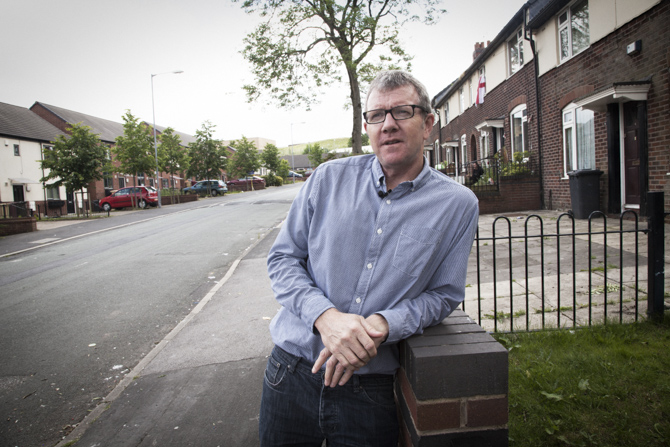
After sheepishly admitting my mistake, we sit in the UCAN’s back yard and do it all again. “Take two,” jokes Tony. “Now, are you sure it’s on this time?”
“Yep. I can see it going round. Tell me again about the characteristics of the UCAN. You said you had to have a defined neighbourhood to work in.”
“It only works if you focus on one area. I’ve always argued you could join with other housing providers to benefit the whole neighbourhood. That’s possible.”
“And what else?”
“You listen to what’s coming through the door and you work with partners – advice services, debt councillors, employment specialists – to meet those needs. Start with what the punters want and let that influence what you spend your money on. It’s simple but it rarely happens.”
“Do you think some organisations are almost afraid to actually talk to their residents?”
“Oh yeah. It takes a lot of courage to open the door and deal with whatever walks through. That’s why people have uniforms and desks to hide behind. UCANs never have reception desks.”
“And I remember the first time round you said that staff have to be passionate about what they do.”
“And non-judgmental. If there’s a ‘professional distance’ between you and the client they will never feel confident with you, never trust you. The barrier has to come down so the clients can get to know something about you, too. It’s really understated but it’s another vital part of the UCAN model. Without it, it wouldn’t work.”
Tony starts to draw a circle with his finger in the air. “How perfect is it for me, as neighbourhood manager, to have ongoing feedback from the community.” He’s on a roll now. “Right now I have a one-to-one relationship between need and budget and that’s as rare as rubies. Low level genius it is,” he laughs.
“And I know I’ve asked you this before, but why isn’t the UCAN model replicated everywhere if it’s so brilliant?”
“It’s not as if we are making a product that everyone can immediately see the benefit of. Ours is a simple idea but it’s been a hard sell.”
“And that has been frustrating for you?”
“Massively frustrating. Even within our own organisation. Some time ago, Bolton at Home made the UCANs fundamental to what we do as a housing association, and thank goodness we did.”
“But they’ve been recognised now, haven’t they?” The UCAN model was highly commended in the finals of a national housing award last week.
“They have, but it’s been difficult to explain which is why we commissioned you to do the blog.”
“Ah yes. First time round you said something about smoke and arse.”
Tony laughs. “I said I wasn’t going to blow smoke up your arse. I believe it’s an American expression.”
“I see.”
“It was the idea of using the blog to showcase our work through individual stories that reflected back on how fantastic the UCANs are. That’s what I wanted and you’ve delivered that in spades so I can’t thank you enough.”
“And thank you. And at the end of our first interview I asked you if there was anything else you wanted to say…”
“… and I delivered an impassioned speech for ten minutes which is now lost for ever. But don’t let that worry you Len.”
“The rain in Spain falls mainly on the plain,” he says in mock BBC English.
“That’s okay, now just put the recorder in your back pocket.”
We’re having a walk around the estate this morning and rather than holding the tape recorder in front of Tony’s face the whole time, I’ve dug out a lapel microphone and wired him up as if he’s about to narrate some TV documentary.
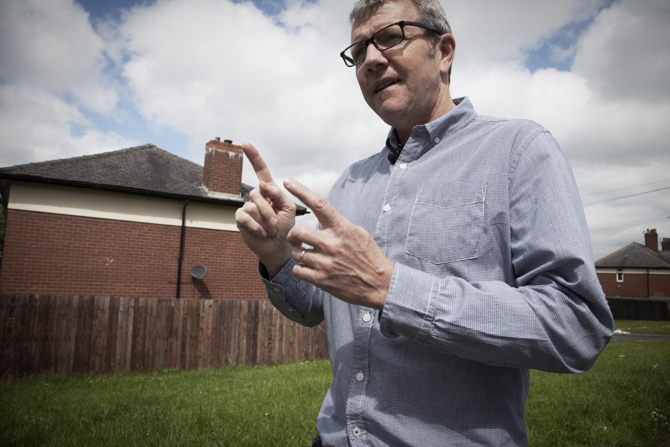
Tony is Bolton at Home’s neighbourhood manager for Breightmet. He’s Vanessa’s boss and before that he used to manage the UCAN himself. He’s passionate about the power of the Urban Care and Neighbourhood Centres and he and his colleagues commissioned me about a year ago, to spread the word with this blog.
“Let’s go up this way,” he says, crossing the busy road outside the UCAN, “I want to show you something.”
As we walk and talk I ask how the idea started. “They were set up in 1999 in one of Bolton’s Private Sector Renewal Areas. I was working for another housing association at the time and I came to visit the very first one. I vividly remember walking out of there and thinking, now that’s how you have an impact on a neighbourhood.
“It started in a single terrace house and was there to offer advice to people who were having their bathrooms and kitchens refurbished. But residents were also coming in asking questions about employment and training or with debt queries. So, rather than turning people away, the staff started to offer a service in response to their residents’ needs. Simple.”
Turning off the main drag we’re on a street festooned with England flags and bunting. “It’s incredible, isn’t it?” says Tony. “It’s been in the Bolton News.”
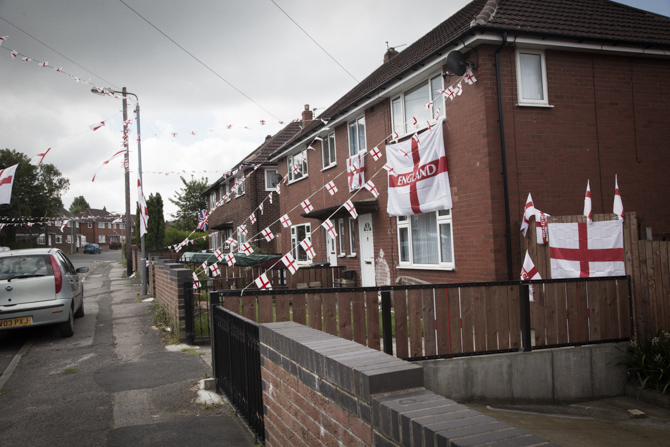
Empty cans and bottles spill out of bin liners on the grass verge. “Someone was having a party last night,” says a young woman passing by.
“Looks like it was a good one,” I reply, taking photos of the rubbish as if I’m collecting evidence.
“It weren’t bad,” she says.
“Working with individuals is a no-brainer for me,” says Tony as we continue our stroll. “It’s always going to be as important as physical regeneration.”
“But that hasn’t always been the case, has it? That’s a relatively recent revelation, and the penny hasn’t dropped everywhere, even now.”
“That’s right. There are still places where they think they can solve the problem just by making a place look better. It’s a very appealing solution. But working with people is the slow, hard bit.”
“Hi Tony,” says a middle-aged woman with a teenage girl in tow.
When Tony enquires, the woman turns her back on her daughter, rolls her eyes, and says, “I got a call from school, didn’t I? She has a temperature. Could I come straight away? She seems fine now.”
The ‘poorly’ girl has walked off down the hill and, as her mother takes off after her, I ask Tony to explain whether housing associations have some sort of legal responsibility to their tenants. What’s in it for them to offer all this support?
“There’s a genuine desire to improve the lives of tenants,” he says, “to go beyond the core functions of collecting rent and doing repairs.”
“So, you don’t have to do it?”
“No, you could stick to your core function and I’m surprised that many associations still do. For some, offering a bit of employment support is a massive step for them. It would be wrong for us to turn round to our tenants and say, we know you are in massive debt but that’s not what we do. For me, the fundamental thing is responding to need.”
I hear the tape click off in his back pocket and so we stop while I turn it over and set it off again.
… continued in Low level genius
“Is there a limit to how much you can put in?” I ask Carl as we stand at the bottom of Monks Lane looking into one of those large walk-in skips.
“No, it’s more first-come-first-served. Each skip is supervised by someone from the skip company who will say what can and can’t go in.”
As if on cue, a resident comes by, “We’ve got an old three-piece. Can I put that in?”
“Oh yeah,” says Carl, “no problem.”
“And can I come and photograph you throwing it away?” I ask.
It’s Environment Week at Breightmet UCAN and for many residents the highlight is ‘skip day’ where seven skips are positioned around the estate for residents to get rid of their unwanted items. They arrive early and once they’re full, that’s it, they’re gone.
We’ve followed Paul back to his house where his partner is waiting in the front garden and the old three piece sits on the drive. “How are you going to move that?” I ask.
Paul points across the road, “My mate’ll help me when he’s up.” It is only just 8am.
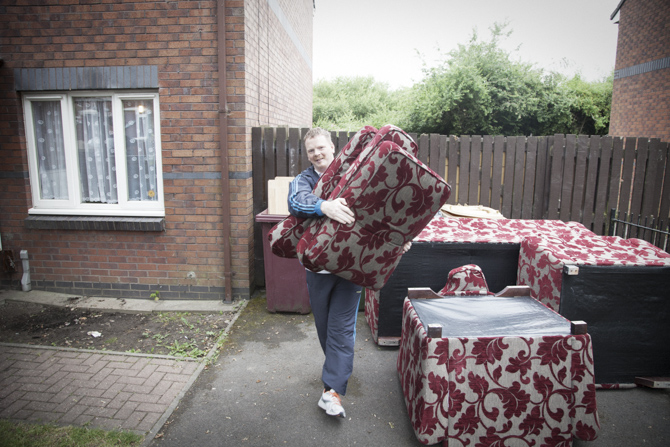
“I think it’s great what you do,” says Amanda, once we’ve introduced ourselves. “It’s about £25 to get any rubbish moved and, you know, people on benefits can’t afford that sort of money.”
“I’m glad it’s making a difference,” says Carl. I check on the Council’s website later: it’s actually £29 for up to five items, rising to £116 for up to 20.
“And it makes the streets look cleaner… without people having all their junk in the front gardens.”
Carl starts to tell Amanda about the other events they’ve held, about the litter pick with the schoolchildren, and about the 47 bags of litter collected from just eight local streets, including this one.
“I know,” she says, “I’ve seen the children go by. They were dead happy, buzzing their heads off. They loved it. I think it’s fantastic what you do at that UCAN.”
I’ve been following the UCAN’s Environment Week on Twitter these last few days. The Estate Rangers and Bolton at Home staff have helped with litter picks; there have been grow your own promotions and a gardening event in the UCAN’s back yard.
“They’re really popular,” Carl says as we wander off towards the next skip, “but it’s not just about putting skips out, it’s about behavioural change as well. We do have a problem with some residents hoarding rubbish and it’s about us working with them to make changes.”
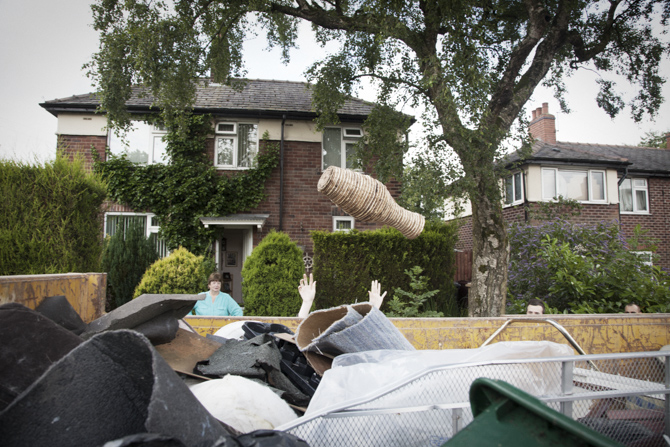
Carl stops to talk to a woman he knows who’s just dropped some bin liners off in the nearly-full skip ahead of us.
“We’re using this week as an opportunity to encourage people to go online and report environmental issues,” he says, “so we can tackle the problems.”
“Yeah,” says the woman, making a face.
“Would you report stuff?” I ask.
“Be honest,” says Carl.
“No,” she says, emphatically. “It’s like ratting on people, isn’ it? You don’t want to be a grass, because that’s what they’ll call you.”
I see a man with a wheelbarrow full of rubbish and leave Carl to continue his discussion.
“Which way are you going with that?” I ask.
“Up there,” he nods towards Padbury Way. “It’s my second trip.”
I point out that there is a nearer skip, across the busy road and down Bridson Lane. “Hang on, I stop the traffic for you.”
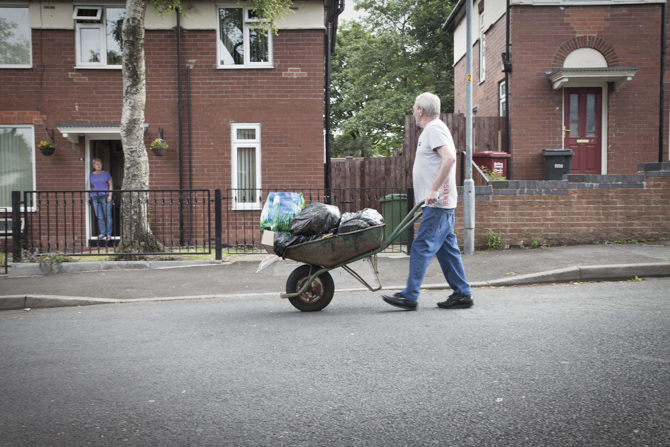
Stephen tells me he’s also got a mattress and television to get rid of but isn’t quite sure how he’s going to get them to the skip.
“They closed the nearest tip a while back and now they charge for collecting it from you. I’ve been keeping all my rubbish in my spare room… nothing else for it.”
“So today has been helpful?”
“Oh yeah. No doubt about it.”






